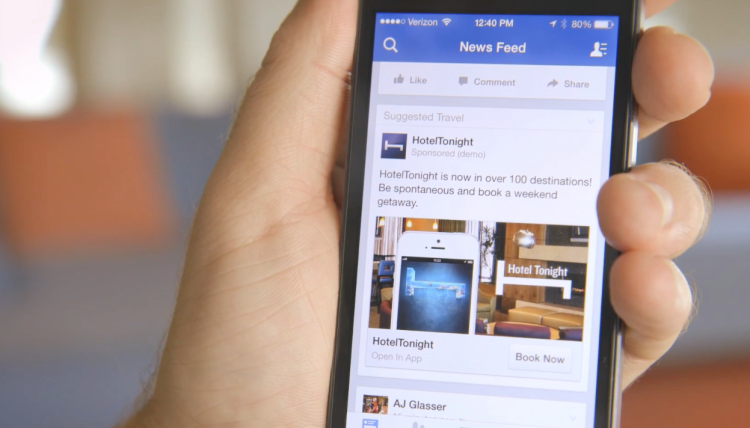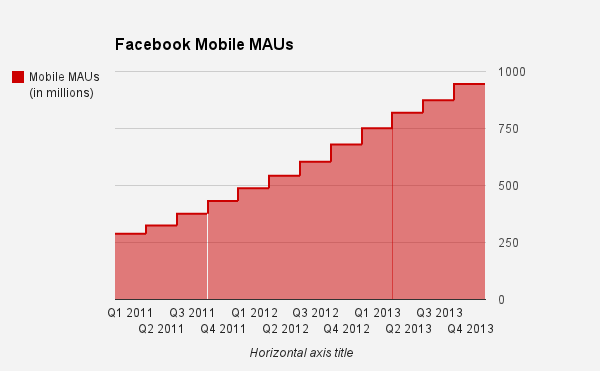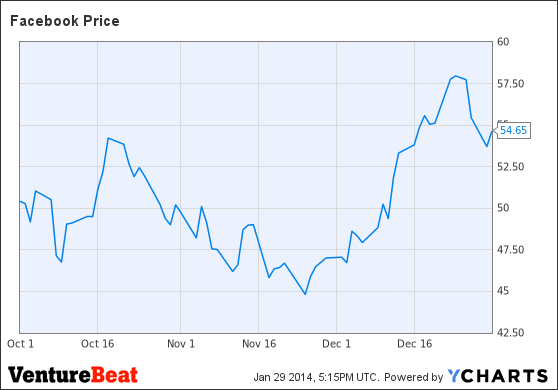Facebook’s major mobile moment is here.
In the company’s earnings report today, we read that Facebook’s mobile numbers have soared — both in terms of mobile users and money coming in from mobile channels.
Facebook’s Q4 in News
- Instagram got ads
- Zuck talks AI
- FB rebels against surveillance
- Zuck to NSA: You’re blowing it
- FB’s shot at saving the mobile web
- The countdown to 1B MAUs begins
The bottom line: Facebook now has 945 million active mobile users, and 53 percent of Facebook’s $2.5 billion in revenue comes from mobile ads for the final three months of last year.
The number of daily Facebook mobile users is up to 556 million — a huge figure compared to the daily user total of 757 million.
Even more interesting: Nearly 300 million users only access Facebook from their phones or tablets. The mobile-only crowd has doubled since this time last year.
“This is a great way to end the year,” said Facebook CEO Mark Zuckerberg in a call on the earnings.
“If 2012 was the year we turned our product into a mobile product, 2013 was the year we turned our business in a mobile business.”
The road to mobile madness
Last summer, Zuckerberg announced, “Soon, we’ll have more revenue on mobile than on desktop.” By October, the company was able to show that 41 percent of all its income came from mobile.
To put that in perspective, the analysts at eMarketer tell us that Facebook accounted for a 18.44 percent share of all mobile ad spending globally in 2013 — a $16.65 billion market, mind you — up from 5.35 percent just one year ago.
And then, there’s the reason all that cash is flowing in: mobile MAUs (monthly active users). By last fall, Facebook was quickly closing in on one billion mobile MAUs.
Today, the report shows strong and accelerating growth on all fronts — mobile revenue, total revenue (up year-over-year by $1 billion for the fourth quarter), and monthly active users (up 16 percent to 1.23 billion).
Here’s a chart showing mobile MAU growth since the beginning of 2011:
Here’s how Facebook did it
Facebook’s mobile success is hard-won and years in the making. In addition to putting mobile technologies in the hands of every engineer across the company (and mobile-first devs in every team), the company has poured its resources into a few key areas — and some of them aren’t so obvious.
- Focus on feature phones: “Facebook’s mission is to make the world more open and connected, and Facebook For Every Phone enables people around the globe to connect to the people and things they care about most, no matter what kind of mobile device they use.” — Facebooker Ryan Makavy
- Focus on mobile-only users: “The big question for us is, which areas are growing the fastest? … Whatever the form factor is going forward, we’ll be able to deliver.” — Zuckerberg
- Focus on mobile web: “We’ve sent a team of people around the world to see what they use, and we care about everybody, not just tech geeks.” — Facebooker Peter Deng
- Focus on global: “Today, only about a third of the world’s population is online. We are in a unique place to encourage broader use of the Internet. … We’re trying to make access to Facebook cheaper, and we feel … this can be applied to other services, too.” — Mark Zuckerberg
- Focus on speed: “We [are] getting improvements out to people quickly while minimizing disruptions for users. Our 4-8 week release timelines feel like a good tradeoff for now.” — Facebooker Christian Legnitto
- Focus on innovation: “Instead of our phones being designed around apps … we can flip that around and design our phones around people first.” — Mark Zuckerberg
Stock price movement
Here’s a look at the company’s stock performance in Q4:
For contrast, here’s how Facebook did side-by-side with some of its competitors (shown as percentage change) in Q4 and the full year:






